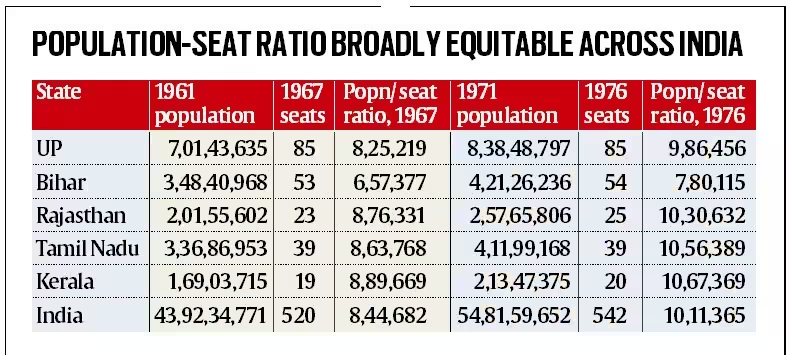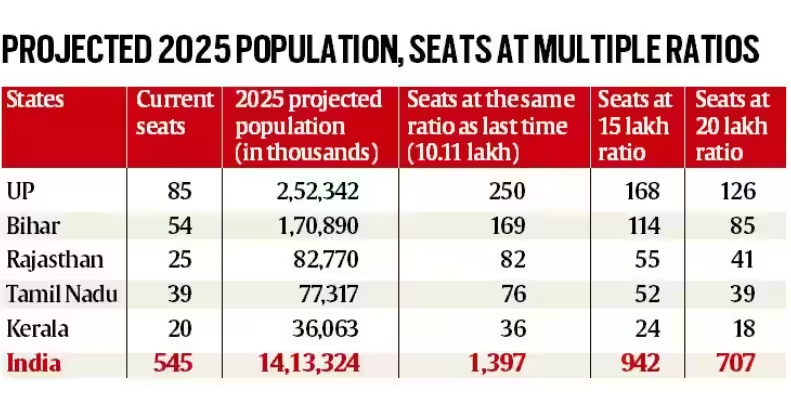Governance
Delimitation Concerns in Women's Reservation Bill, 2023
- 30 Sep 2023
- 7 min read
For Prelims: Women's Reservation Bill,2023, Delimitation Commission, Article 82, Article 170
For Mains: Indian Constitution, Elections, Statutory Bodies, Delimitation Process
Why in News?
The recent passage of the Women's Reservation Bill,2023 in the Indian Parliament has been hailed as a historic milestone towards gender equality in the country's political landscape.
- However, the fate of this landmark legislation is currently intertwined with the issue of delimitation, a move criticized by opposition parties.
What is Delimitation?
- About:
- Delimitation is the process of redrawing parliamentary or assembly seat borders to ensure an equal number of voters in each constituency.
- It is done every few years after each census to ensure each constituency has one representative in both the Lok Sabha and state assembly across the nation.
- Delimitation links population increase to the number of elected legislators in a state, ensuring that no delegates are overrepresented or underrepresented.
- Constitutional Provisions Related to Delimitation:
- Article 82:
- The Parliament enacts a Delimitation Act after every census. This act allows the Parliament to readjust the allocation of seats in the Lok Sabha and the Legislative Assemblies of States.
- Article 170:
- This article deals with the composition of state Legislative Assemblies, specifying a minimum of 60 members and a maximum of 500.
- The size of the population, as determined by the most recent census, forms the basis for delimitation and seat distribution.
- Article 82:
- Delimitation Commission:
- The Delimitation Commission Act was enacted in 1952.
- Once the Act is in force, the Union government sets up a Delimitation Commission.
- Delimitation Commissions have been set up four times 1952, 1963, 1973 and 2002 under the Acts of 1952, 1962, 1972 and 2002.
- The Delimitation Commission is appointed by the President of India and works in collaboration with the Election Commission of India.
- The commission's main task is to redraw the boundaries based on a recent census.
- The current boundaries of the Lok Sabha and State Assembly constituencies were drawn on the basis of the 2001 Census by the Delimitation Commission of 2002.
- However, the number of seats allocated to each state in the Lok Sabha and the total number of seats in a Legislative Assembly were frozen on the basis of the 1971 Census by the 42nd Amendment Act of 1976.
- This freeze was extended until the first census after 2026 by the 84th Amendment Act of 2001.
- The Delimitation Commission Act was enacted in 1952.
How is Women's Reservation Bill,2023 Linked to Delimitation?
- The Indian government has stated that the Women's Reservation Bill, 2023 will come into effect only after the delimitation exercise is undertaken based on the census data, which has been delayed due to the Covid-19 pandemic and several other reasons has been further pushed to 2024-25 until further orders.
- The government has argued that linking the reservation with delimitation will ensure a transparent and fair allocation of seats for women, and will also increase the total number of seats for both men and women, as the delimitation exercise is expected to raise the strength of the Lok Sabha and the state assemblies seats.
What are the Concerns Regarding the Delimitation?
- Potential Underrepresentation:
- One of the primary concerns is that if delimitation is carried out based on population parameters, southern states like Telangana and others that have successfully implemented population control measures may face underrepresentation in Parliament.
- This fear arises from the possibility that northern states with higher population growth, such as Bihar and Uttar Pradesh, could gain more seats in Parliament at the expense of the south.
- Despite having only 18% of the country's population, the southern states contribute 35% to the country's GDP.
- Leaders argue that their economic strength should be reflected in political representation to ensure that their interests are adequately represented.
- Southern political leaders worry that a shift in the number of Lok Sabha seats towards northern states could result in a reduced political voice for the South at the national level.
- One of the primary concerns is that if delimitation is carried out based on population parameters, southern states like Telangana and others that have successfully implemented population control measures may face underrepresentation in Parliament.
- Linkage with Women's Reservation Bill:
- The government's decision to link the implementation of the Women's Reservation Bill with delimitation is a major concern for opposition parties.
- Opposition argues that there is no apparent reason or requirement to connect the two issues, as there was no such linkage in previous discussions of the women's reservation Bill.
- They suggest that the government could have chosen to delink the women's quota from the census and delimitation. A simpler bill could have allowed all parties to ensure 33% reservation for women within the current architecture of the Lok Sabha.
 |
 |
Legal Insights
UPSC Civil Services Examination Previous Year Questions (PYQs)
Prelims
Q. With reference to the Delimitation Commission consider the following statements: (2012)
- The orders of the Delimitation Commission cannot be challenged in a Court of Law.
- When the orders of the Delimitation Commission are laid before the Lok Sabha or State Legislative Assembly, they cannot effect any modification in the orders.
Which of the statements given above is/are correct?
(a) 1 only
(b) 2 only
(c) Both 1 and 2
(d) Neither 1 nor 2
Ans: (c)






